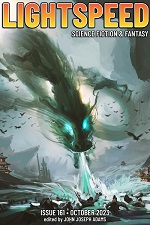“Where the God-Knives Tread” by A. L. Goldfuss
“Four Self-Care Secrets for a Long and Happy Life” by Tina S. Zhu
“The Void Wyrm’s Guide to Devouring Stars” by AJ Wentz
“Immortality Soup, Or, An Excerpt from the Cookbook of the Gods” by Oluwatomiwa Ajeigbe
“A Small God” by Jeff Reynolds
“Excerpts from a Scientist’s Notebook: Ancestral Memory in Europan Pseudocephalopods” by David DeGraff
“What You Are and the Wolf” by Jae Steinbacher
Reviewed by Victoria Silverwolf
Instead of its usual eight short stories, this month the magazine provides a novelette and half a dozen shorter works.
“Where the God-Knives Tread” by A. L. Goldfuss is the single novelette. Two people explore a gigantic starship from an ancient galactic empire, in search of the fabulous technological treasure it contains. One of them has a hidden motive. The huge vessel contains unexpected dangers.
Combining space opera with science fiction horror, this story is notable for a complex background and for the relationship between the two protagonists. The text contains flashbacks that do not contribute much to the plot, but offer insight into the characters. Leisurely at first, the pace eventually becomes frenzied. Some aspects of the climax are not entirely clear.
“Four Self-Care Secrets for a Long and Happy Life” by Tina S. Zhu is a brief piece consisting of advice from a were-fox to others of its kind. The tone is light, if not openly comic. This trifle makes for pleasant, if slight, reading.
Just as short is “The Void Wyrm’s Guide to Devouring Stars” by AJ Wentz. An aging being that feeds on stars offers its wisdom to a younger member of its species. The author manages to allow the reader to empathize with the creature, and the ending provides a touch of poignancy.
“Immortality Soup, Or, An Excerpt from the Cookbook of the Gods” by Oluwatomiwa Ajeigbe consists of a series of instructions, nearly impossible to follow, that would allow a demigod to feed on a substance that would grant it eternal life. The author of the cookbook, a being that has achieved immortality in a different way, reveals much about itself within the recipe.
Cleverly written with subtle wit, this imaginative story also offers a wealth of exotic details about gods, demigods, and the fantastic ingredients needed to make the magical soup. The end reveals why the immortal being is writing the cookbook, adding a note of irony.
“A Small God” by Jeff Reynolds is the magazine’s shortest story. A nondescript deity makes a gesture, hoping for a reply. This tiny tale is heartwarming, but begs for more of a conclusion.
Nearly as short is “Excerpts from a Scientist’s Notebook: Ancestral Memory in Europan Pseudocephalopods” by David DeGraff. Brief notes from a woman studying an alien species reveal the tragic loss of her mother, and describe her own dedication to science.
The imaginary biology of squid-like creatures from a moon of Jupiter is the most interesting aspect of this story. The characterization and emotional content are not without merit, but could be more developed.
“What You Are and the Wolf” by Jae Steinbacher is a variation on the story of “Little Red Riding Hood” narrated in second person. “You” are a girl on the edge of womanhood who speaks with a wolf while on the way to grandmother’s house. The animal has apparently taken a missing child with itself. When you face the possibility of being forced into an unhappy marriage, you take matters into your own hands.
The story is well-written, but there are few surprises in the plot. The use of second person narration adds little, if anything, to the work, and runs the risk of seeming pretentious.
Victoria Silverwolf notes that this issue’s single novelette is more than one and one-half times as long as the other six stories combined.
 Lightspeed
Lightspeed